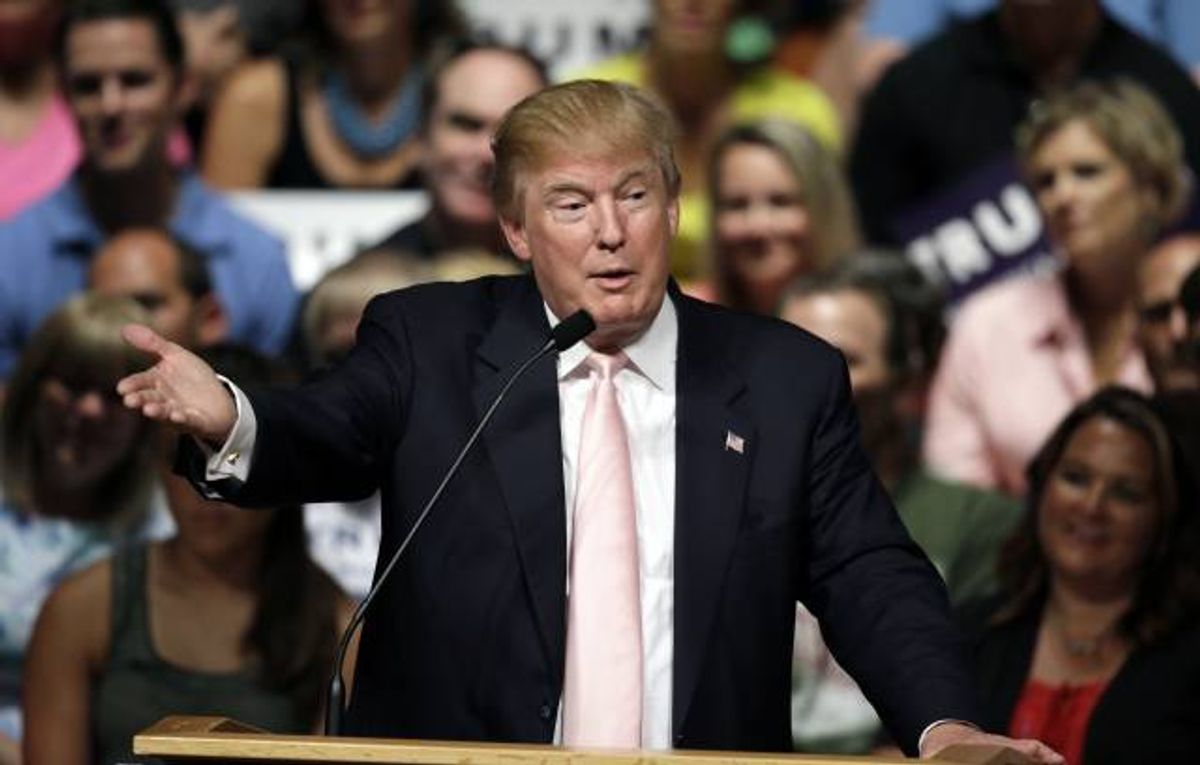His continued success in national polls notwithstanding, I still think it’s quite unlikely that the Republican Party’s next presidential nominee will be Donald Trump. In fact, I’d guess that one of main reasons why he’s been so resilient is because the GOP establishment finds him so mortifying, which appeals to Republicans who think RINOs are to blame for all of the country’s ills. In other words, once the election is less of a hypothetical — and once these people shift their attention from trolling Reince Priebus to defeating Hillary Clinton — I expect we’ll see Trump’s numbers drop.
However that plays out, though, this much is undeniable: For a significant number of Republicans, Donald Trump can currently do no wrong. And while this group does not even comprise a majority of Republicans, both the field of GOP candidates and the number of registered GOPers is big. So we’re talking about a group whose influence could be wildly disproportionate — and whose ranks are quite numerous already. It’s worth understanding, then, what it is about Trump that these people love. Because even if he eventually drops out, Trump’s supporters will still play a big role in selecting the GOP’s next nominee for president.
Recently, I touched on what it is about Trump that I think these folks consider most appealing — namely, the unbridled fear and disdain he provokes from an ill-defined establishment. And if I had to pick just one explanation, the feeling that backing Trump is equivalent to flipping the bird at one’s self-styled betters would still be my choice. But there’s another element of Trump’s campaign that, while similar, is distinct enough that it deserves special mention. It’s the idea that his exorbitant wealth saves him from having to cater to rich donors, and that this liberates him to run for office without becoming “a politician.”
Indeed, that “not a politician” phrase comes up in seemingly every report on Trump’s fans you can find. Generally, the description is offered as an explanation for why Trump will say bigoted things about Mexican immigrants or President Obama’s birth certificate that other candidates won’t. But Trump relies on the same motif, too, and has begun to conflate his willingness to be politically incorrect with his ability to completely self-finance his campaign. As he said on “Morning Joe” less than two weeks back, “Somebody that’s reliant on all of these lobbyists and special interests and donors, they have no power.” To Trump, dependence and weakness are one and the same.
That line was delivered in reference to Jeb Bush’s already raising more than $100 million. It wasn’t a one-off, either. Repeatedly, Trump has tried to use Bush’s fundraising prowess — which the former Florida governor had once hoped would scare his opponents into quitting — against him. “He raises 100 million, so what does 100 million mean?” Trump said in mid-July. “100 million means he's doing favors for so many people,” he answered. “It means lobbyists, it means special interests, it means donors.” Trump then claimed his knowledge came from personal experience: “Who knows it better than me? I give to everybody. They do whatever I want."
As focused on Bush as Trump has been, he hasn’t only wielded this argument against the establishment favorite. For example, he told supporters during a campaign rally in Iowa this weekend that all of his opponents were ultimately following someone else’s orders; and that those orders came from wealthy people just like him. “Bush is controlled by those people,” Trump said. “[Scott] Walker is controlled by those people. Hillary Clinton is controlled by those people.” But “Trump has none of those people,” he added, speaking briefly in the third-person. “I’m not controlled. I do what’s right for the people.”
One small business owner at the rally told the Wall Street Journal that Trump is prospering because he’s “saying the things we really feel,” the things “[p]oliticians can’t say … because they are so afraid of somebody they will offend.” If he’s like most Trump fans, he probably said this with Trump’s awful statements about Mexican immigrants in mind. But if this fan thinks Trump’s coded racism is a sign not of bigotry but bravery, it’s easy to imagine him expecting Trump to tell the pro-immigration reform Chamber of Commerce to take a hike. Thanks to his machismo and his wealth, Trump becomes, at least in the eyes of many of his backers, a symbol of the kind of fearless individualism they see as integral to their identity as conservatives.
If we want to understand why this specific type of voter likes Trump, I think that emphasis on rugged individualism is important. Because while it’s easy to imagine many people who aren’t conservative being attracted to a candidate who isn’t in anyone else’s pocket, the nature of that independence — and what it says about how we think the U.S. government should be run — matters a great deal. For Trump and those who buy his argument, it’s desirable to have such a rich man be president because of the “strength” and conviction he’d bring to the office, not because there’s anything corrupting or distorting about politicized wealth. Under this logic, Trump’s distance from everyone else is a plus.
But if you’re someone who thinks campaign finance in the U.S. is a problem because it subverts democracy — not because it produces leaders who are dependent and weak — then endorsing an even more undemocratic approach is hardly a solution. That is, however, exactly what Trump is proposing. And it’s yet another reason why his current moment in the sun, while fascinating, should make those of us who do not immediately understand his appeal nervous.



Shares